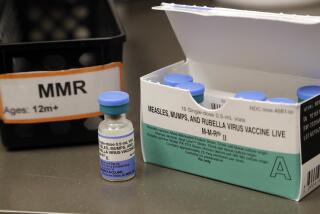Study points to years-long immune system woes from measles
Scientists have known for decades that having measles suppresses kids’ immune systems for several weeks or months, leaving them ill-equipped to fight off pneumonia, bronchitis, diarrheal diseases and other infections.
Now a team of researchers has suggested that the measles virus may also confer a longer-lasting sort of “immune-amnesia” that makes it harder for people to stave off other illnesses for two years or more.
That re-emphasizes the importance of vaccination, said biologist Michael Mina, lead author of a paper detailing the research that was published Thursday in the journal Science.
“There may be a long-lasting impact that you can’t undo if your child gets measles,” he said. “I hope this study can impress upon people the danger measles poses.”
The researchers used what Mina called “an unconventional approach” to search for the long-lasting immune system effects. Previous work in macaque monkeys suggested that monkeys with the disease lost white blood cells their bodies had trained to fight off other illnesses, gaining new ones that were primed only to combat measles -- their bodies essentially forgetting how to recognize and neutralize other pathogens and leaving them vulnerable to infection.
To test if a similar thing may occur in humans, the group mined historical data to tease out the relationship between measles incidence and deaths from other infectious diseases.
They turned to data from England and Wales -- developed nations where disease levels are generally low, allowing a less-muddled view of measles’ effects. Studying measles incidence and deaths from infectious disease both before and after the introduction of the measles vaccine in the U.K. in the 1960s, Mina and the team saw a sort of shadow effect, where deaths from a variety of non-measles infectious diseases closely tracked measles incidence. The more measles in a population, the more deaths from other illnesses in the 28-month period that followed.
The same trend emerged when they studied similar data from the U.S. and from Denmark.
“Really it didn’t matter what age group, what decade or what country,” said Mina, a medical student at Emory University in Atlanta who worked on the study as a postdoctoral researcher at Princeton University in New Jersey. “They all showed consistent results ... what we’re suggesting happens over the long term is that your immune system works fine, but it has forgotten what it previously learned.”
Some researchers who were not involved in the work questioned whether the reductions in deaths as measles cases declined may have had more to do with improving nutrition and smaller family size than with prolonged immune suppression. (Mina said that the team did not see the same effect with rubella, suggesting that was not the case.)
Others thought the paper’s notion of years-long suppression was plausible but said they could not comment on the mathematical models the group used. Diane Griffin, a microbiologist and immunologist at Johns Hopkins University in Baltimore, said she thought it was not clear that “immunologic amnesia” was an underlying cause. “I do not think the mechanism or mechanisms are understood,” she said.
To know for certain what was behind the effect the group saw, Mina agreed, scientists would need to look at immune cells and observe their behavior. He said he would like to push the work in a more traditional direction: back into the laboratory.
“The results here are so compelling that it warrants seeing if we can draw blood from these kids who are getting measles,” he said. But, he added, the new study could also shake up researchers’ approach to understanding infectious disease.
“I’m hoping the paper, beyond its results, will introduce a new way of merging immunology and population biology,” he said.
Boston University virologist Paul Duprex, a co-author on the earlier research in macaques, said that the research, while mathematically dense, was “a really neat paper” that should remind people of the importance of vaccinating children against measles, which still kills 150,000 people in the world every year.
In the pre-vaccine era when everyone got measles, he noted, many more kids fell prey to secondary infections. “After the introduction of the vaccine that didn’t happen,” he added. “Measles is not a disease that doesn’t cause trouble.”
For more on science and health, follow me on Twitter: @LATerynbrown







